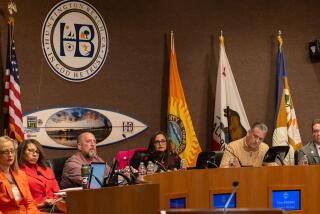Unsung School Volunteers Look Like a Million Dollars
- Share via
Last spring Huntington Beach school officials sponsored a modest little breakfast get-together that went totally unnoticed by the general public, but which was rather remarkable.
It was the district’s salute to its volunteers, and officials capped the ceremony by unveiling a mock check for $1 million--the figure that they said represented the volunteers’ effort during the school year.
One million dollars? Sitting in the audience that morning, I remember thinking, That must have been one helluva bake sale.
Shows what I know.
In an era of ever-tighter school budgets, the work of volunteers may be the best-kept secret in public education.
Did you know that parents, college students, senior citizens, business representatives--just to name a few groups--contribute their time during school, after school or on weekends for such critical functions as instruction or tutoring?
Me neither.
Oh, I had some vague sense that moms helped out in classrooms, but I thought it was for relatively mundane chores. And, of course, I know about booster clubs and PTAs and traditional programs.
But $1 million?
“Anymore, schools can’t function without volunteers,” said Kay Bergdahl, who coordinates volunteer programs for the Huntington Beach Union High School District and who is also president of the statewide School Volunteer Partnership program. “We need so much of it with overcrowded classrooms. The tutors are in class at all levels, not only elementary. Once, it used to be thought of as parents helping elementary kids, but junior high students need it more than ever.”
At Edison High School where she works, 431 volunteers logged 40,000 hours last year, Bergdahl said.
I think I’m hip to that sometimes uneasy alliance between school officials and parents. My father was a small-town school superintendent and, later, an urban high school teacher. He talked one minute about the importance of parents being involved in their children’s education and the next minute about what a royal pain they could be if they tried to run the show.
That fine line still has to be walked, Bergdahl said, and is made easier than in the old days because of orientation and training programs for the volunteers.
I was curious whether Bergdahl lamented the need for volunteers or applauded their presence.
“Whether the schools needed them or not, I’m a firm believer in parental involvement,” Bergdahl said. “I believe they have to be involved with their children. Don’t send them off to school and say, ‘Teacher, it’s your job.’ Parenting is a full-time job and they have to know what’s happening in the schools.”
But the other side of the coin, Bergdahl said, is that many districts do need the extra help. Often it takes the form of after-school or weekend tutoring, such as in math or science. Or, it might involve a professional builder, for example, assisting a shop teacher in showing kids how to build something.
“It’s good that they’re picking up the pieces for the funding we don’t have,” Bergdahl said. “There are just so many things our kids wouldn’t have if we didn’t have the parents or community raising funds or doing projects for us.”
She cited one after-school math tutor in his late 20s who was a class valedictorian and a civil engineer with a master’s degree. He got a drunk driving conviction and was sentenced to 500 hours of community service. Rather than pick up trash, he decided he could be more productive tutoring students and has proved a boon.
There are examples all over the place. I’ve probably bored you talking about the nuts and bolts of volunteers, when the real story is the human beings.
There are touching stories, Bergdahl said, of the senior-citizen volunteer who becomes a surrogate grandparent for a youngster, or the younger volunteer who becomes a second parent, perhaps, for a child from a broken home. “It’s just that extra adult warm touch, saying, ‘I care about you,’ ” Bergdahl said.
In educational jargon, they say the “paradigm is changing.” To you and me, it means things ain’t like they used to be in American schools. It also means that you don’t necessarily need a teaching certificate to get involved in America’s classrooms.
And while it may be true that there’s a crisis a day in education, it’s also true that every day some professional is giving up his or her lunch hour to open a kid’s eyes, or senior citizens are lending their wisdom to a youngster.
You can’t put a price tag on stuff like that.
Or come to think of it, maybe, like they did in Huntington Beach, you can.
More to Read
Sign up for Essential California
The most important California stories and recommendations in your inbox every morning.
You may occasionally receive promotional content from the Los Angeles Times.













